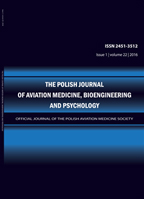2013, Volume 19, Issue 2
Personality According to the “Big Five” Model and Styles of Coping with Stress among Aircraft Crew Members
Aleksandra Szewczyk1, Jan F. Terelak2
-------------------------------------------------------------------------------------------------
1Insitute of Psychology, Cardinal Stefan Wyszynski University
2Department of Flight Safety, Military Institute of Aviation Medicine
Autor korenspondencyjny: Jan F. Terelak; Department of Flight Safety, Military Institute of Aviation Medicine; email: jterelak[at]wiml.waw.pl
Full text
Streszczenie
Introduction. This is an empirical work concerning correlations between personality and style of coping with stress among pilots and board crew of commercial aircrafts. Methods. Two groups were subjected to analysis: experimental group – pilots (n=19) and board crew of commercial aircrafts (n=22) and control group – merchants (n=28). Styles of coping with stress were studied using Polish version of Coping Inventory for Stressful Situations (CISS) by N.S. Endler and D.A. Parker. Personality assessment was performed with the help of NEO-FFI questionnaire by P.T. Costa and R.R. McCrae based on Five Factor Theory of Personality. Results. We demonstrated diff erences between pilots and board crew and control group with regard to the style of coping with stress that were determined by personality. Discussion. Correlations between extraversion, scrupulousness, open-mindedness and preferences for task-oriented or avoiding style of coping with stress as well as neuroticism and emotional style of coping with stress were highlighted. Discussion concerns differences between experimental and control groups with regard to the choice of style of coping with stress. Conclusions. Differences with regard to styles of coping with stress in both studied groups may result from natural professional preselection of aircraft staff.
Słowa kluczowe
pilots, pilots, aircraft personnel, aircraft personnel, coping with stress, coping with stress, “big-five” theory of personality, “big-five” theory of personality
